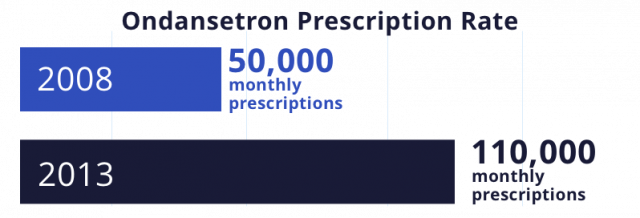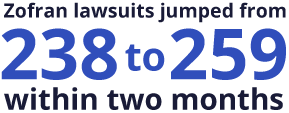Zofran Lawsuits
Zofran (ondansetron) has been hailed as the most-prescribed pharmaceutical treatment for morning sickness. However, the U.S. Food and Drug Administration never approved the drug for that use. Families of children who suffered birth defects after mothers took Zofran while pregnant have sued GlaxoSmithKline over allegations that it marketed the drug to pregnant women without FDA approval and failed to warn about risks.
Heart defects, cleft palate and skull deformities are some of the birth defects mothers say resulted from their use of the anti-nausea drug Zofran during pregnancy. As a result, GlaxoSmithKline (GSK), the company that originally marketed the drug, has been named in more than 600 actions in federal court.
Lawsuits against GSK allege that the company unlawfully and fraudulently promoted Zofran as a way to treat morning sickness, a use not approved by the U.S. Food and Drug Administration. They also allege the company misrepresented the results of animal studies, claiming the studies showed the drug was safe — when they actually showed abnormal bone growth and signs of toxicity — and erroneously claimed Zofran was safe for pregnant women.
Off-Label Use for Morning Sickness Grows
In 1983, the maker of the only FDA-approved medication used to treat morning sickness withdrew the product, Bendectin, from the market, leaving pregnant women suffering from nausea and vomiting with no approved medical treatments.
Eight years later, in 1991, the FDA approved Zofran to help cancer patients with nausea and vomiting after chemotherapy or radiotherapy treatments or surgery. Some doctors whose patients suffered from morning sickness began prescribing Zofran to treat symptoms, even though it lacked FDA approval for that use.
Doctors also prescribed the drug to treat hyperemesis gravidarum, a rare disorder that causes extreme nausea and vomiting and weight loss during pregnancy, which can endanger the mother and unborn baby. Zofran was never approved for that use either.
For many women, the drug was effective in relieving their symptoms, and physicians began to prescribe it widely for that purpose. But lawsuits allege GSK took it a step further and began to actively promote Zofran for morning sickness, despite the fact that it’s illegal to promote drugs for off-label use.
Use of ondansetron, the generic name for Zofran, to treat nausea and vomiting in pregnancy jumped from 50,000 monthly prescriptions in 2008 to 110,000 at the end of 2013, according to an article published in 2014 in the American Journal of Obstetrics and Gynecology. The surge occurred despite concerns regarding fetal safety.
Today, there are about 4 million pregnancies a year in the United States. An estimated 1 million pregnant women in the country are exposed to ondansetron.

First Birth Defect Claims Filed in 2015
Some Zofran users say their babies suffered severe birth defects that render them forever dependent on their parents for care.
In February 2015, a Minnesota mother filed the first Zofran lawsuit after two daughters were born with congenital heart defects. More lawsuits quickly followed. The Zofran-related legal claims center on the cause of birth defects and whether the drug maker is liable for injuries suffered by babies whose mothers took the medication while pregnant.
The first Zofran-related lawsuit was filed on February 12, 2015, in the U.S. District Court, Eastern District of Pennsylvania, by Minnesota mother Cheri Flynn on behalf of two children who were born with serious heart abnormalities. Flynn was prescribed Zofran early in her first trimester of pregnancy to control morning sickness.
A daughter born in 2004 was developmentally delayed and had to undergo surgery in 2011 to repair a hole in her heart. A second daughter, born in 2006, also suffered from a congenital heart defect.
Court documents show GSK knew as early as 1992 that Zofran presented “unreasonable risk of harm” to developing babies because the drug passes through the human placenta. Despite this knowledge, the drugmaker continued to market the drug to expectant mothers. The company even paid doctors to prescribe it, lawsuits allege.
- LeClair v. GlaxoSmithKline
- Four days after the first lawsuit was filed, Tomisha LeClair of Massachusetts filed the second. LeClair took Zofran to treat severe nausea and vomiting. Her daughter – identified as A.S. in court documents – was born in 2000 with several congenital defects, including several heart defects, facial dysmorphia, low set ears, hearing loss, webbed toes, sensitivity to light and an inguinal hernia. A.S. had 10 surgeries in 12 years to try to correct several abnormalities.
- Kutzer v. GlaxoSmithKline
- In July 2015, Angela and Brian Kutzer filed a claim that GSK paid doctors to promote and prescribe Zofran and made “false representations about the safety and efficacy” of the drug. The couple’s son was born in 2007 with multiple defects, including a missing kidney and an incomplete vas deferens, the duct through which sperm travels from the testicle to the urethra. The defect may impact his ability to produce children.
- Davis and Hanke v. GlaxoSmithKline
- Ashley Davis and Charles Janke III filed suit in April 2016. Their son, identified as C.J., was born in 2007 with cleft palate and cleft lip after Ashley was prescribed and began taking Zofran early in her first trimester of pregnancy to alleviate morning sickness. The couple says “C.J. has experienced a delay in his physical, language and psychological development and interference with speaking and dental development.”
Lawsuits Moved to an MDL in Boston
In a span of six months, families filed Zofran lawsuits in federal courts across the country, including in Alabama, Arkansas, Louisiana, Massachusetts, Montana, New Jersey, Ohio and Texas.
In July 2015, GSK asked the Judicial Panel on Multidistrict Litigation (MDL) to centralize the lawsuits in Philadelphia. Plaintiffs in the cases agreed that consolidation was warranted but disagreed on location. The judicial panel issued a court order in October 2015, transferring 12 Zofran lawsuits to the U.S. District Court of Massachusetts.
“Centralization will eliminate duplicative discovery; prevent inconsistent pretrial rulings; and conserve the resources of the parties, their counsel, and the judiciary.”
Judge F. Dennis Saylor IV, who oversaw the cases, appointed three veteran attorneys to lead the litigation against GSK: Kimberly Barone Baden of Motley Rice, Elizabeth Graham of Grant & Eisenhofer and Tobias Millrood of Pogust Braslow & Millrood.
Hundreds of Cases Pending
By December 2015, more than 150 Zofran lawsuits had been centralized in the U.S. District Court of Massachusetts. That month, GSK filed a motion to dismiss the lawsuits. In January 2016, Judge Saylor ruled to allow more than 200 Zofran lawsuits to proceed, rejecting GSK’s arguments for dismissal.
But by 2022, most of these cases had been dismissed. As of November 2022, there have been no new developments.

The number of Zofran lawsuits jumped to 238 by March 2016. Two months later, 259 actions had been brought under the MDL.
As of September 2018, 623 total actions had been filed and 459 actions were still pending. The discovery phase of the proceedings began in 2016. As of October 2018, GSK and plaintiffs were selecting 16 cases (eight each) for the first bellwether trials. No trial date has been scheduled, and GSK has offered no settlements in pending cases.
GSK Agrees to Pay $3 Billion
Prior to the wave of personal injury lawsuits in 2015, the U.S. Department of Justice had brought a lawsuit against GSK, alleging the company “promoted certain forms of Zofran, approved only for post-operative nausea, for the treatment of morning sickness in pregnant women.”
In 2012, GSK pleaded guilty to federal charges of fraud and illegal promotion of several drugs. GSK agreed to pay $3 billion to the U.S. and certain states as part of the legal settlement, which included allegations that the company paid kickbacks to doctors for prescribing Zofran and eight other drugs.
- Knowingly promoted the sale and use of Zofran for a variety of conditions other than those for which its use was approved as safe and effective by the FDA (including hyperemesis and pregnancy-related nausea)
- Made and/or disseminated unsubstantiated and/or false representations or statements about the safety and efficacy of Zofran concerning its use for conditions, including hyperemesis and pregnancy-related nausea
- Offered and paid illegal kickbacks to health care professionals to encourage them to promote and prescribe Zofran, in violation of federal anti-kickback laws
The settlement was deemed the largest health care fraud settlement in U.S. history. Then-Deputy Attorney General James M. Cole called it “unprecedented in both size and scope.”
FDA Issues Warning Letter
The Justice Department’s lawsuit was not the first time GSK came under fire for its marketing of Zofran.
In March 1999, the FDA issued GSK a warning letter for distributing promotional materials that present “Zofran in a manner that is false or misleading because it lacks fair balance.”
The agency’s Division of Drug Marketing, Advertising and Communications (DDMAC) concluded promotional material for Zofran violated the Federal Food, Drug and Cosmetic Act because it “fails to present any information relating to the side risks associated with the drug.”
The agency ordered GSK to “immediately cease distribution” of Zofran promotional material that lacks risk information.
Calling this number connects you with a Drugwatch.com representative. We will direct you to one of our trusted legal partners for a free case review.
Drugwatch.com's trusted legal partners support the organization's mission to keep people safe from dangerous drugs and medical devices. For more information, visit our partners page.


